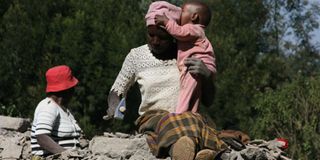Countries urged to tackle women's unpaid labour

A woman working at a quarry with her baby. Experts say that as long as unpaid care work remains unquantified, unrecognised and unpaid, it will continue to be gender insensitive.
What you need to know:
- One in three women currently spend more than nine hours on childcare daily, against one in four women before the pandemic.
- The global economy would be $3 trillion richer every year if these hours were untied for women to spend them on paid labour.
Global efforts to recover from the economic blow caused by Covid-19 must tackle the huge burden of unpaid labour that rests on women's shoulders, a gender equality advocate has said.
One in three women currently spend more than nine hours on childcare daily compared to one in four women before the pandemic period, data from the Bill & Melinda Gates Foundation shows.
But the global economy would be $3 trillion richer each year if these hours were untied and spent on paid labour instead, findings by Eurasia Group indicate.
“One of the clearest opportunities to bring women back into the workforce is to address the huge unpaid care burden faced by women,” Gates Foundation Eastern Africa regional representative Samburu Wa-Shiko told Nation.Africa.
He says women in Africa are most affected by unpaid labour, hence the urgency to invest in childcare programmes that enable them to access economic opportunities.
He said evidence from provision of subsidised childcare programmes in informal settlements has shown that this leads to increasing women's employability by 17.3 per cent.
“Lack of support for childcare is stopping African economies from building back faster and more strongly,” he reckons.
“Childcare provision is an overlooked opportunity to boost women’s participation in the labour force and provide quality jobs for women.”
The philanthropic foundation has committed to spend $650 million to support women's economic empowerment over the next five years, with a percentage of the sum apportioned to strengthening the care economy across the world.
In East Africa, Tanzania's government has expressly announced its plans to expand childcare programmes by 2026.
The move will upscale national multi-sector childcare programmes and establish community-based childcare centres in villages, workplace and market centres, Vice President Philip Mpango said in July.





